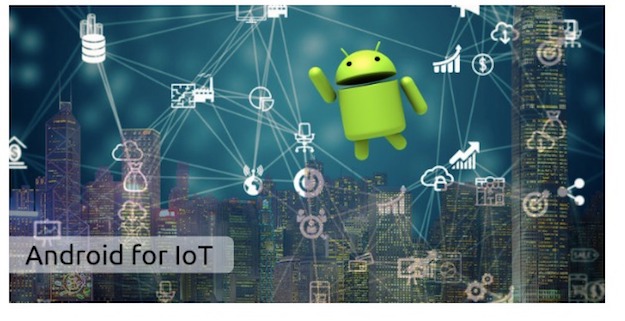Wouldn’t it be great if you can get you can switch on your central home air conditioner an hour before you come home and keep the temperature perfect just in time for you come in? A few years back, these were all theoretical discussions, but with the combination of IoT and Android, you can control any smart device from anywhere. All you need is an internet connection and the control will be at your fingertips.
When we say Android, the first thing we remember is smartphones. But the application of Android extends far more than that. Nowadays, Android is being used in televisions, smart watches, computers, etc.
A lot of these smart devices are working perfectly well standalone. But isn’t there something more than all these smart devices could go? That’s where the importance of the Internet of Things (IoT) comes in. IoT enables to promote the interconnected communications between these multiple smart devices by gathering, sending and receiving information thereby paving way for a more sophisticated performance.
A Platform for IoT
Technology has increased to such an extent that you can control your smart TV, refrigerators, microwave ovens and many such appliances from your mobile phones. All these interconnected conversations between these devices can only be possible with the help of a platform to run it on.
Android has become the popular choice for the IoT devices to run majorly because of its universality. Android and iOS are the only two major platforms among which more than three-fourth of the smart devices running on Android. Obviously, Android is the preferable choice for developers to work with IoT devices.
Also, another major advantage of Android over iOS is that Android is an open source platform making it easier for developers to access and modify the code according to the application and the device for which they are developing. Android is also the cost-efficient option to design, develop and use in any kind of smart devices with numerous choices for integration with the other smart devices.
Don’t Miss —
How Android App Developers Can Convert an iPhone App into an Android App
List of Common Android Errors with their Solutions
Android Things at the Forefront
One of the recent developments that have helped speed up this Android-IoT collaboration to the next level is the release of Android Things.
Android Things was officially released in May 2018 which furthered simplified the process for the developers to use Android for IoT devices. Android Things in nothing but an Android platform designed to be used in any kind of these IoT devices. Developers now do not need to worry about the security of the platform they are using or its maintenance. This can greatly cut down the hours they put in and the investment required for developing an IoT device. Now with the help of Android Things, developers can directly start focussing on building the main product.
With this release of Android Things, it is now possible to buy smart devices which can communicate with each other easily without any obstructions. Now you can get different smart devices like a built-in remote controller for your refrigerator and a smartwatch and use the watch to control it. You don’t need to worry about the compatibility of the devices because all the to-be-released IoT devices will predominantly run on Android.
What’s better is that Android Things will enforce high-level security by protecting the identity even when collecting the data. With the release of Android Things, we have started hearing lot of whispers about many major companies entering the field of IoT and the year 2019 is expected to see a lot of IoT-powered smart devices with Android as its backbone.
So, what does Google get from extending the reach of Android? Well, with Android becoming the only platform used across all kinds of smart devices, Google can collect more valuable data through various means other than from just computers and smartphones. It can also, in the future, open the possibility of using these Android spaces for advertisements and increasing its revenue.
Along with the release of the first version of the Android Things, Google also announced the development partnerships with System on Modules for Things for some hardware platforms – NXP, Qualcomm and MediaTek. You can get the hardware development kits for some models of these companies to get your IoT project started right away!
Developers can use the same Android Library and Android Studio they have used for the development of mobile applications for the use of other smart devices too.
In Conclusion
IoT is at the forefront leading the digital revolution and Android is just the right support it needed to rapidly fast forward the implementation of its advantages in real life scenarios. In a few years, this combination of Android and IoT is expected to take the advancement of the technology and the innovations of smart devices to a whole new level. Let’s wait and see what this collaboration has in store for us in the coming years.

